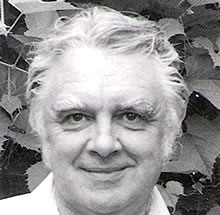Victor Turner
- JOHN JANARO
The development of the modern scientific study of anthropology seemed to offer a promising field for religious skeptics.
 Indeed, the explosion of empirical data in 19th-century Europe about the behaviors of diverse human groups in every part of the world seemed to jolt the conventional Western Christian view of a common human nature and destiny. But anthropology turned out to be far from unanimous in supporting a secular materialist or relativist understanding of humanity. Some anthropologists who dedicated themselves to the careful study of human behaviors were led to abandon secularism and rediscover the fundamental human reality of "the religious sense."
Indeed, the explosion of empirical data in 19th-century Europe about the behaviors of diverse human groups in every part of the world seemed to jolt the conventional Western Christian view of a common human nature and destiny. But anthropology turned out to be far from unanimous in supporting a secular materialist or relativist understanding of humanity. Some anthropologists who dedicated themselves to the careful study of human behaviors were led to abandon secularism and rediscover the fundamental human reality of "the religious sense."
Such was the journey of British anthropologist Victor Turner (1920–1983). He grew up in a broken family with no formal religious upbringing. He was an avid reader, however, who sought a stable purpose for his life with youthful idealism. From his mother, a classical theater actress, he inherited an abiding interest in drama. He also read widely in literature and philosophy and was for a time fascinated by Christian mysticism. From these sources, Victor cobbled together his own peculiar mixture of skepticism and curiosity; but like so many young intellectuals of interwar Europe, he ultimately looked to Marxism as the viable way to make a meaningful contribution to humanity's future.
In 1942, he married Edith Davis, who remained his greatest companion and collaborator for the rest of his life. Together they discovered that anthropology offered a kind of bridge between their commitment to rationalistic science and their sense of the importance of human drama. (Similar motivations led them to join the Communist Party for a time during Victor's graduate studies in Manchester.) Needing fieldwork for his Ph.D., Victor and Edith went to live among the Ndembu people in Southern Africa in 1950. Their three years with this traditional tribal society changed their lives.
Victor expected to reduce to mundane social science classifications the (animist) religious rituals of the Ndembu. But the very attention he gave to the human complexity of their lives overturned his paradigm. He became convinced that religion corresponded to an undeniable and distinctive dimension of their lives. This persistent verification of the "spirituality" of the Ndembu reawakened his own "religious sense." When the Turners returned to England, they looked at Europe's Christian heritage with new eyes. While writing his dissertation and then his groundbreaking book Schism and Continuity in an African Society, Victor was also doing his own study of Christian theology. He realized that the great tradition of the early Church Fathers, the saints, the theology of Augustine and Thomas Aquinas all pointed to the real synthesis of reasonableness, human drama, and mystery: Jesus Christ himself. Meanwhile, the Turners visited different Christian services in search of that reality of ritual, that sense of the sacred that they had experienced among the Ndembu in Africa. When they saw the Catholic Mass, they were uniquely struck by the gestures of the priest and the reverence for the Eucharist. Here they found what they were looking for…and something more.
Victor Turner, his wife, and their three children were received into the Catholic Church in the Easter season of 1958. His subsequent fruitful and eminent career as an anthropologist was an emphatic witness to the integral truth of the human person and the human religious sense.
 This is Meaghen Gonzalez, Editor of CERC. I hope you appreciated this piece. We curate these articles especially for believers like you.
This is Meaghen Gonzalez, Editor of CERC. I hope you appreciated this piece. We curate these articles especially for believers like you.
Please show your appreciation by making a $3 donation. CERC is entirely reader supported.

Acknowledgement
 John Janaro "Victor Turner." Magnificat (August, 2019).
John Janaro "Victor Turner." Magnificat (August, 2019).
Reprinted with permission of Magnificat.
The Author

 John Janaro is Associate Professor Emeritus of Theology at Christendom College. He is a Catholic theologian, and a writer, researcher, and lecturer on issues in religion and culture. He is the author of Never Give Up: My Life and God's Mercy and The Created Person and the Mystery of God: The Significance of Religion in Human Life. He is married to Eileen Janaro and has five children.
John Janaro is Associate Professor Emeritus of Theology at Christendom College. He is a Catholic theologian, and a writer, researcher, and lecturer on issues in religion and culture. He is the author of Never Give Up: My Life and God's Mercy and The Created Person and the Mystery of God: The Significance of Religion in Human Life. He is married to Eileen Janaro and has five children.




